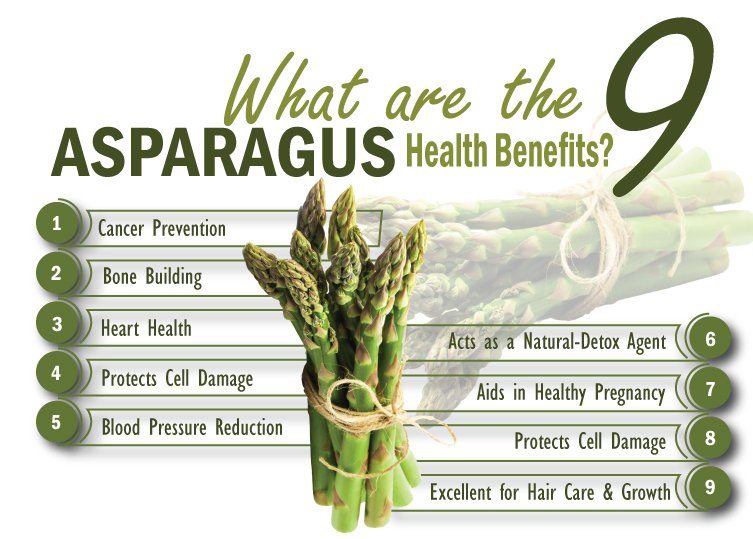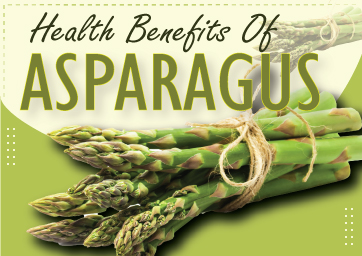What is Exactly Asparagus?
Asparagus is a member of the lily family (Liliaceae) and is native to Europe, Asia, and North America. Its scientific name is Asparagus Officinalis L.
Asparagus' name originates from the Greek word aspages, meaning "thorny." Asparagus was considered a fertility symbol in ancient Greece and Rome due to its association with Demeter and Persephone's goddesses.
Asparagus is eaten primarily as a vegetable, although some people eat it raw. In addition to being consumed fresh, it is processed into many culinary preparations, including soups, salads, steamed dishes, stir-fries, pasta, and sauces.
Types of Asparagus
You can buy two categories of Asparagus - green, and white. Green Asparagus grows above ground, while white Asparagus grows below ground. Both types of Asparagus are cultivated primarily for their edible stems.
Nutrition Facts of Asparagus
The nutritional value of Asparagus is high, and they are loaded with vitamins and minerals. Asparagus contains vitamins A, C, E, K, B-complex, folate, pantothenic acid, biotin, niacin, thiamine, riboflavin, pyridoxine, vitamin D, folic acid, iron, copper, manganese, zinc, selenium, and iodine.
These nutrients provide many health benefits. One cup of cooked Asparagus contains:
● About 100% of the daily requirement for Vitamin A.
● 40% of the Vitamin C requirements.
● 60% of the Vitamin K requirements.
● 25% of the Vitamin B12 requirements.
● 20% of the Riboflavin requirements.
● 50% of the Folate requirements.
● 30% of the Pantothenic Acid requirements.
● 15% of the Niacin requirements.
What are the 9 Asparagus Health Benefits?
Now that we know how healthy Asparagus is for our body, let's look at some of its primary health benefits.

1. Cancer Prevention
Asparagus contains polysaccharides that have been shown to prevent cancer cells from multiplying. When they do reproduce, they cause cancerous tumors to shrink. Studies show that people who consume more Asparagus are less likely to develop breast cancer than those who don't eat as much Asparagus. Researchers believe that Asparagus may help prevent cancer by reducing estrogen levels.
2. Bone Building
Eating Asparagus regularly may increase bone mineral density, a factor associated with osteoporosis and fracture. Researchers suggest that asparagus' lignans—a phytonutrient similar to flaxseed oil's alpha-linolenic acid—may improve bone mass. Lignans appear to play a role in regulating hormones that affect bone production.
3. Heart Health
A lower risk of heart disease has been linked to a diet rich in fruits and vegetables. One cup of raw Asparagus accounts for nearly 15% of the daily recommended value for vitamin K. Vitamin K is necessary for preventing excessive bleeding when a blood vessel is injured.
4. Blood Pressure Reduction
Asparagus is known to reduce high blood pressure. Studies have shown that people who consumed two servings of Asparagus per week had lower blood pressure than those who did not eat any asparagus. The active ingredient in Asparagus is called L-arginine. L-arginine helps relax muscles in the body and lowers blood pressure.
5. Protects Cell Damage
Antioxidants are substances that protect body cells from damage. Free radicals are unstable molecules that can damage DNA and harm cells. Asparagus has been shown to contain antioxidants that protect body cells from oxidative damage.
6. Improves Digestion
Asparagus increases hydrochloric acid production in the stomach, making digestion easier. Research shows that increasing the intake of Asparagus can improve symptoms of indigestion and constipation.
7. Excellent for Hair Care & Growth
Asparagus is known to promote hair growth and strengthen hair follicles. A study published in the International Journal of Dermatology found that people who consumed three cups of Asparagus daily saw thicker hair, shinier hair, and stronger roots.
8. Aids in Healthy Pregnancy
The best food for moms-to-be is Asparagus! It contains high amounts of folic acid and folate, both necessary for pregnant women and their developing babies. Folate helps protect unborn children from congenital disabilities, while folic acid is even more important and helps prevent neural tube defects.
9. Acts as a Natural-Detox Agent
Toxins that we consume must exit our bodies in some way. The liver, kidneys, lungs, skin, and intestines are the central organ systems through which our body detoxifies. Asparagus keeps these organs functioning at their best, preventing the development of toxins in the bloodstream. Asparagus has also been linked to improved kidney and bladder self-cleansing. Glutathione, a well-known antioxidant that supports detoxification, is present in it.
How to Consume Asparagus?
There are many ways to eat Asparagus. Most people prefer to enjoy Asparagus by boiling it in water and dipping it into homemade ranch dressing!
● By Boiling: Boil some water in a pan. Add asparagus spears to the pan and cover with a lid. Turn the flame low and heat the pot for another 5 minutes so that the .asparagus turns tender. Drain the water and serve immediately.
● By Steaming: Fill a steamer basket with Asparagus and place over a pan with water until it reaches just above the bottom of the stalks. Cover pan and steam until Asparagus is crisp-tender, about 5 minutes. Remove Asparagus and serve immediately.
You can also try these recipes:
• Roasted Asparagus Salad
• Baked Asparagus Quiche
• Asparagus Soup
• Asparagus Pasta Primavera
• Creamed Asparagus

Asparagus Side Effects
Asparagus has many positive health benefits. And it is considered safe by food experts. However, some people who consume it may experience nausea, headaches, diarrhea, vomiting, and abdominal pain. These symptoms are not dangerous, but they should be reported to their doctor if they occur frequently. Other less frequent Asparagus side effects include:
1. Weight gain
It is possible to gain weight after consuming Asparagus. This can happen if the person consumes too much Asparagus at once. Weight gain can also result from eating Asparagus regularly. If you want to lose weight, eat less Asparagus.
2. Heartburn
Heartburn is caused when acid refluxes back up from the stomach into the esophagus. People who suffer from acid reflux may notice heartburn after eating Asparagus. Eating foods rich in fiber is recommended to help prevent heartburn.
3. Nausea
If you feel sick too often, eat Asparagus in moderation. If Asparagus is consumed in excess, nausea may result.
Smaller servings of Asparagus can aid in preventing motion sickness. Before and after eating Asparagus, be sure to drink enough water. You will have good fluid levels and won't feel nauseated.
4. Constipation
Constipation is a hard stool that does not pass easily. constipation can be caused by overeating Asparagus or drinking too little water. Eaten in small amounts, Asparagus can help relieve constipation. Drinking enough water can also help.
7. Indigestion
Indigestion is when food remains in the digestive tract longer than usual. Indigestion can cause discomfort in the stomach and intestines. Symptoms of indigestion include bloating, cramps, gas, diarrhea, and nausea.
Can Asparagus Help in Weight Loss?
The fiber in Asparagus helps lower cholesterol and regulate blood sugar levels. Eating Asparagus has also been associated with weight loss. A study published in the American Journal of Clinical Nutrition showed that participants ate 28% fewer calories after eating two meals containing 1 pound of cooked Asparagus.
Can You Eat Asparagus Daily?
You'll want to eat at least two bunches per week (about 15 stalks) to reap the full benefit. If you you're going to add serious flavor to your daily diet, try adding a few spears of purple Asparagus to your breakfast oatmeal, smoothie bowl, salad, or baked potatoes.
Conclusion
Asparagus is very popular among food lovers for its crunchy texture and nutritional value. But the best part is, you can prepare it within just a few minutes.
So, do yourself a great favor by enjoying the health benefits of Asparagus. Pick a handful of these delicious edible roots from your nearest grocery store today! Enjoy.



 Contact Us
Contact Us






 Hospitals
Hospitals
 Doctors
Doctors
 Diagnostic
Diagnostic
 Pharmacy
Pharmacy
 Health Tips
Health Tips
 Blog
Blog



















Comments